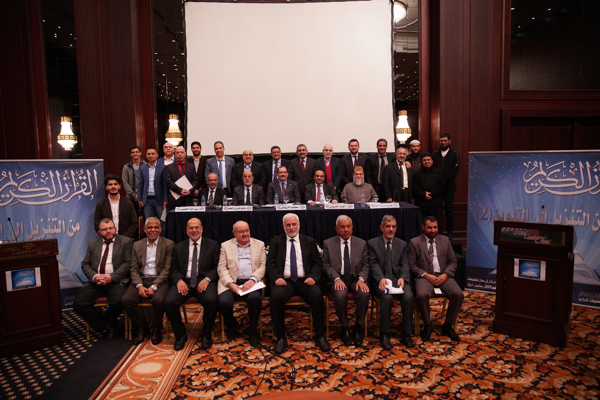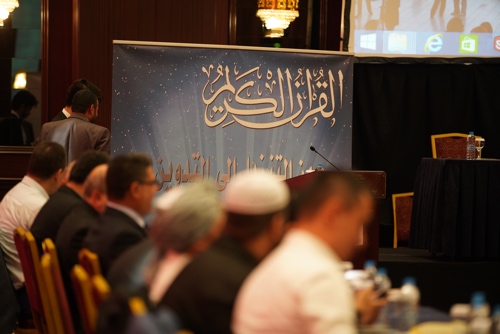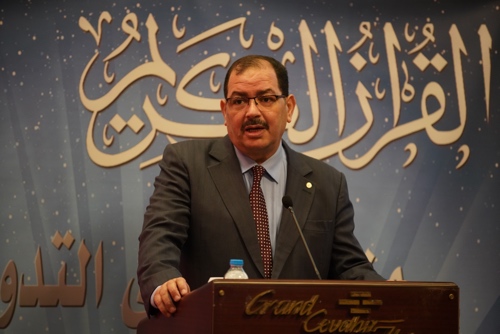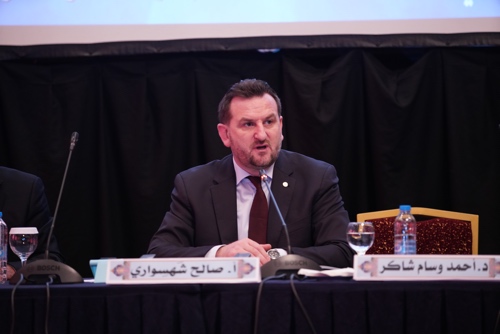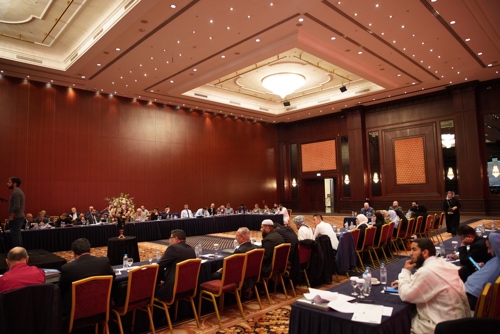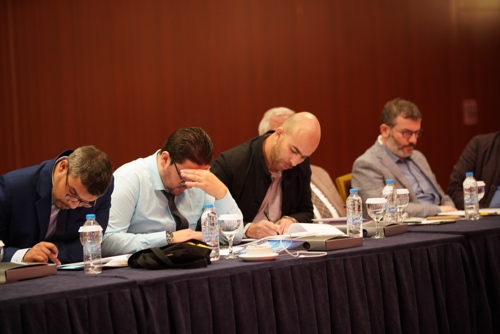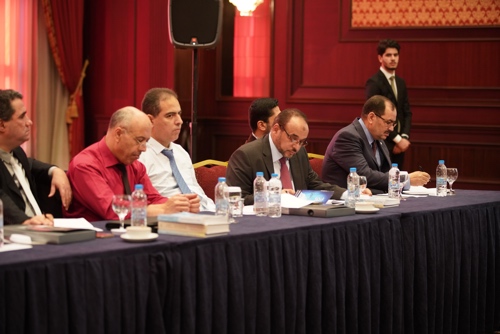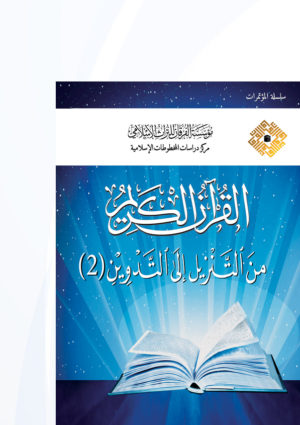Al-Furqān Islamic Heritage Foundation - The Centre for the Study of Islamic Manuscripts organised the 2nd international conference dedicated to the Qur’an manuscripts, titled “The Noble Qur’ān from Revelation to Compilation” (2)., whichtook place on Saturday and Sunday, 9-10 November 2019, in Istanbul, Turkey. Ten specialist researchers from different countries participated in this second conference. This conference was convened in response to the majority of recommendations made in the first conference on the same subject, held on Saturday and Sunday, 26-27 November 2017, at the same location. The majority of that conference’s participants had requested more in-depth studies and further discussion on the critical historical stage of compilation and transcription of the Qur’ān.
The first day was distinguished by two scientific sessions, which followed the opening session where Mr Sali Shahsivari, the Managing Director of Al-Furqan, delivered a speech on behalf of Al-Furqān Islamic Heritage Foundation. Mr Shahsivari welcomed the esteemed scholars and researchers participating in the conference, thanked them for enduring sleepless nights and tiring travel to prepare for and attend this conference, and praised their cooperation with the conference organising committee. He expressed his sincere wishes to all the participants for a pleasant and enjoyable time in Istanbul, and continued success in their scientific endeavours. He reflected on the fact that the conference coincided with an occasion dear to the hearts of Muslims, namely the birth of Prophet Muhammad, peace be upon him. It also complemented the work of the first conference, and was a positive response to the recommendations of Al-Furqān’s Board of Experts. This body had advised that Al-Furqān Foundation focus attention on the Noble Qur’ān from the phase of revelation to that of collation and transcription. The conference also represented a worthy scientific effort added to the commendable work executed by Al-Furqān Foundation in the service of Islamic heritage.
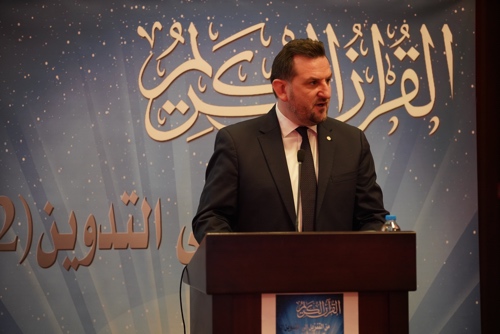
Mr Shahsivari also emphasised that the conference aimed to pave the way for a substantial scientific project that challenges the specious arguments (shubuhāt) posed by some orientalists in their writings about the critical phase of compiling the Qur’ān.
Professor Ekmeleddin Ihsanoglu, Member of the Board of Directors of Al-Furqan, moderated the first scientific session, in which Dr Ghanim Qaddouri al-Hamad, Dr Adel Ibrahim Abu Shaar, and Dr Mohamad Khazir Salih al-Majali, each presented a scientific paper.
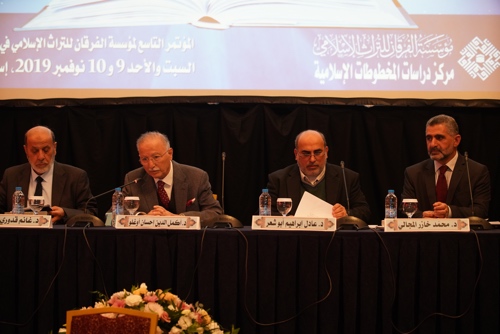
Dr Ghanim Qaddouri al-Hamad’s paper explored the topic “Recording the Qur’ān in writing during the Prophetic era”. He emphasised the topic’s importance, and cited the misleading ideas persisting in the minds of researchers, most notably orientalists. This was because the majority of such workers lacked the texts, evidences, and emerging facts on the issue that would add weight to existing material found in Qur’ān history and sciences textbooks. Dr al-Hamad alluded to the opinions of scholars on the issue of Qur’ān writing during the Prophetic era, where some Companions, may God be pleased with them, had undertaken this duty. He considered that opinion was divided between two camps: one considered that written recording was complete, based on authentic Islamic traditions and reports, while the other considered this to have been only partial; the latter being embraced by orientalists and their like, despite such a claim lacking solid evidence to support it.
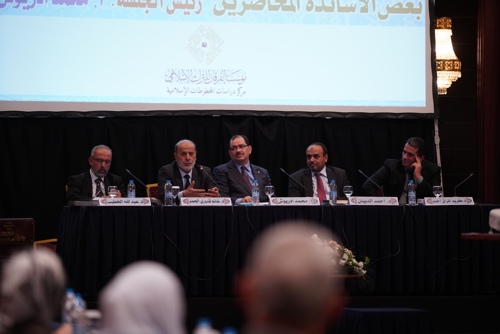
Dr Adel Ibrahim Abu Shaar’s paper addressed “Writing the Noble Qur’ān in the time of the Prophet, peace be upon him”. Given that so much hinged upon it, this is a sensitive period requiring authentication of reports, and verifying the credibility of statements. He therefore subdivided his paper into three main areas of enquiry:
The first addressed the majority of opinions regarding the written compilation of the Noble Qur’ān.
The second addressed writing in the Prophet’s time, its instruments and system.
The third focused on the writing of the Noble Qur’ān by the scholars among the Noble Companions, directly supervised by the Prophet peace be upon him. Indeed, when the Prophet peace be upon him passed away, he had been satisfied that the Qur’ān was preserved to memory and also written down. Furthermore, the orthography of the Muṣ’ḥafwas also prey to the same phenomena of omission, interpolation, etc., as was common in Arabic orthography.
The third paper titled “The truth of ‘Uthmān’s (may Allah be pleased with him) action in abrogating Qur’ān copies”by Dr Mohamad Khazir Salih al-Majali, examined the issue of ‘Uthmān, may Allah be pleased with him, ordering for the Qur’ān - collated during the times of both the Prophet and his successor, Caliph Abǖ Bakr peace be upon him - to be transcribed once more, in such a way that took into consideration all the established facets of reading. This was performed by a committee composed of the most knowledgeable Companions on the Qur’ān. He then instructed copies of thisMuṣ’ḥafto be sent to all the territories, in the company of one or more teachers, and subsequently, destroyedall other Qur’ān copies.
This session witnessed rich discussion, focusing on the necessity of distinguishing between the three phases of compilation of the Muṣḥaf, namely the time of the Messenger, peace be upon him, the time of Caliph Abǖ Bakr al-Ṣiddīq, and finally, its re-issue by ‘Uthmān b. ‘Affān. In addition, discussion also stressed the need to examine and authenticate the chains of narration (sanad) and content (matn) of reports describing this phase, to enable sound scientific conclusions to be drawn. At the same time, granting due attention to the Qur’ān script (rasm), orthography and diacritics, and confronting all the specious claims made in this regard.
Dr Ghanim Qaddouri al-Hamad presided over the evening session, comprising the presentation of three papers.
The first by Dr Iyad Salim Salih al-Samarrai was titled “Qur’ān manuscripts and their role in confirming uncommon narrations relating to orthography, pointing and diacritics”. He alluded to the importance of studying history of Qur’ān orthography and script, and the methodological foundations on which this was established. He mentioned the most prominent diacritics and dotting (i‘jām) marks used in Qur’ān manuscript copies examined by eminent scholars of this science in the past, and described in their authored works. These marks are absent in the orthography of current Qur’ān copies, and as such many researchers and persons interested in the Noble Qur’ān and its sciences are unacquainted with them.
The second paper was presented by Dr Karim Ifraq, titled “History of compilation of the Noble Qur’ān: A comparative codicological study of early Qur’ān copies”. He attempted to refute some of this specious arguments raised by orientalists about the compilation phase of the Noble Qur’ān. For this purpose, he presented a set of traditional, transmitted textual (naqlī) and rational (‘aqlī) proofs, as well as material evidence extracted from comparing between the oldest copies of the Noble Qur’ān; these establish evidence that Qur’ān compilation was free of these specious claims, as well as affirm the fact that Allah, the Almighty, had protected it from change.
The third presentation was given by Dr Ahmad bin Mohammed Al-Dubayan, titled “Methodological criticism of the theory of Syriac and Aramaic texts in the Noble Qur’ān”. He began by summarising the majority of orientalist studies relating to the Noble Qur’ān, and refuted some of the orientalist studies based on the hypothesis that foundational texts existed within the Noble Qur’ān that originated from the books of older religions, Judaism and Christianity especially. He explained that this was a purely philological hypothesis, lacking in historical, archaeological, and scientific evidence, and betrays a large gap in understanding the language commonalities between Semitic peoples.
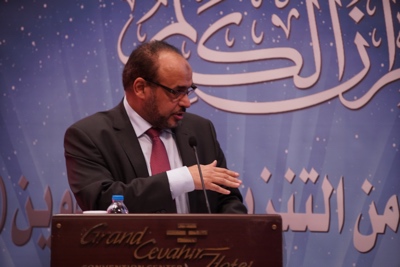
This session was followed by rich discussions and scientific responses, mostly focused on the necessity of subjecting archaic Qur’ān manuscripts to proper codicological studies, then examining them in light of Muṣ’ḥafscience, extracting the canonical readings (qirā’āt), script, vocalisation marks and diacritics, text divisions, and verse count. Moreover, to review orientalist writings on the compilation phase of the Noble Qur’ān, and prepare robust scientific responses.
On the second day of the conference, two sessions were convened:
The morning session was presided over by Mr Sali Shahsivari, Managing Director of Al-Furqān , where three papers were presented.
Professor Mohamad Kharubat presented the paper titled “Orientalists and the Qur’ān canonical readings from the book ’The History of the Qurʾān’ by Theodor Nöldeke”. He chose this work as representative of orientalist writings on the Qur’ān, given that it is the oldest, most prominent and renowned. It covered the issues of compilation and transcription, order of chapters (sūrah), canonical readings, script or rasm, among others. Professor Kharubat concluded that it contained many spurious claims in concepts and terminology, and random comparisons between the Qur’ān copies attributed to the Noble Companions, may Allah be pleased with them. However, it still exerted a significant influence on the majority of studies that followed; indeed, it also influenced some Arabic studies of the Noble Qur’ān.
The second paper by Dr Ahmad Wisam Shakir titled “Yemen’s Muṣḥafcopies: The discoveries of Qur’ān parchments in Sanaa Grand Mosque”presented the most important manuscript finds in the period from 1965 to 2018 CE. The majority were Qur’ān parchments, of which he prepared a descriptive study, and illustrated the processes taken to classify, conserve, treat, preserve and catalogue them. He then presented a general overview in terms of the script and colours used in the writing and decoration, etc. He also discussed and refuted the controversy raised in the West alleging that these finds contradict the current Qur’ān text.
Dr Ahmad Muflih al-Qudat delivered the third paper titled “Response to the ‘Corpus Coranicum’ project: Reflections on the terms ’Qur’ān’ and ’Book (kitāb)’ ”. He attempted to describe the Corpus Coranicum project in its origins, history and aims through two terms: the first being the given term “Qur’ān”, which indicates preservation through memorisation, by unbroken chain of narrators (sanad muttaṣil), and robust correct rendition; the second being the given name “Kitābor Book”, meaning compilation and writing of the Revelation in the Prophet’s time, and in the time of the two Caliphs, Abū Bakr and ‘Uthmān, may Allah be pleased with them. He refuted the thesis of those who proposed reading the Qur’ān by meaning, by highlighting the importance of verbal transmission of the Noble Qur’ān, and that variances in readings were explicitly and authentically attributable to the Prophet, peace be upon him.
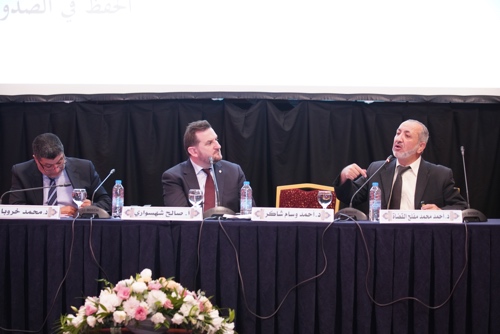
This presentation was followed by a contribution by Dr Asma Hilali, who attempted to evaluate the scientific studies conducted on the Yemen manuscripts. She mentioned some of the obstacles that impeded such studies, and presented her experience in studying Yemenite parchments, focused on the “upper text” (accepted) and the “lower text” (erased). She concluded in her study that there were only slight differences in the ”lower text”, such as order, extra letters, or other; And that these errors were probably the reason why the text was erased. At the end of her presentation, she expressed her wish that the Yemenite parchments would be digitised, in order to ease the work of interested researchers and scholars.
This was followed by intensive discussion and scholarly responses, mostly centred on the reasons why specious arguments existed in orientalist books and studies. Moreover, the need to re-examine these works using a refined methodology, and prepare robust scientific responses by expert scholars.
The evening session was presided over by Mr Mohamed Drioueche, Head of Projects and Publications at Al-Furqan, and was distinguished by a lecture delivered by Dr Abdallah Abdul Rahman al-Khatib, titled “Encyclopaedia of the Qur’ān: Reflections on the problematic issues of objectivity, bias, and knowledge perspective”. The researcher began by mentioning an established fact relating to the dominance of western colonial bias in Qur’ān studies. This had purposely ignored all Islamic methodologies of transmission and compilation. He then introduced the work, Encyclopaedia of the Qur’ān, from the methodological and objective perspective, with examples extracted from within. He concluded by presenting critical perspectives into some of its older, but repeated content, that had simply been repackaged. He concluded that the Encyclopaedia presents the western view of Qur’ān studies, and completely neglects the Islamic perspective of the topic. This in itself was sufficient to judge it as lacking objectivity.
The lecture was followed by an open session with Dr Ghanim Qaddouri al-Hamad, Dr Ahmad bin Mohammed Al-Dubayan, and Dr Karim Ifraq.
Dr Ghanim emphasised the importance of the project to re-examine the canonical readings in light of dotted Qur’ān copies from the first three centuries. He advocated establishing a database dedicated to the canonical readings through the centuries, while quite urgently following, translating, and scientifically refuting all that has been written by Orientalists. He suggested that the forthcoming conference address scientific studies relating to the origins and evolution of Arabic script and orthography, on the basis of archaic material evidence.
Dr Al-Dubayan impressed upon the necessity of completing the important and grand project started by Al-Furqān Foundation through the previous two conferences. He hoped this would open the door for other specialised scholars to deepen and enrich studies on the topic. Furthermore, he highlighted the necessity of directing the younger generation to the original sources and scientific studies that are necessary references in the Quranic studies, so that they are not affected by the orientalists’ distortions and malady.
Dr Karim Ifraq thanked Al-Furqān Foundation for this distinguished conference, covering a large gap in this fine scientific discipline, requiring coordinated and intensive efforts to refute all the specious arguments posed by orientalists.
Dr Abdallah Abdul Rahman al-Khatib emphasised that work in this domain must be as a collective, and within the framework of a specialised organisation supervising the preparation of a scientific encyclopaedia of the Qur’ān, which presents the Islamic perspective in both Arabic and world languages.
This was followed by an open discussion session, focused on the necessity of understanding the orientalist methodology and discourse to successfully respond. It was also emphasised not to underestimate the efforts that had been undertaken in this domain. Yet, in parallel, it was necessary to continue work through further coordination and unified efforts.
Finally, the recommendations of the conference were read out. In the closing speech, Mr Mohamed Drioueche, thanked all the participating scholars, and all those credited with the conference’s organisation, headed by His Excellency Ahmad Zaki Yamani, Chairman of Al-Furqān Islamic Heritage Foundation, and his son, Mr Sharaf Zaki Yamani, as well as all those who had contributed in small or large part to the success of the conference.
The conference concluded - as it had begun - with a recitation of verses from the Noble Qur’ān.
Conference Recommendations
The conference delegates agreed on the need for:
- Al-Furqān Islamic Heritage Foundation to continue working tirelessly in the critical civilizational domain of defending the Muṣḥaf, i.e. the written copy of the Noble Qur’ān—Muslim’s holiest book, by organising a third conference, addressing areas additional to those raised in the previous two, namely the origins and evolution of Arabic orthography, by commissioning scholars to present detailed studies in surveying, reviewing, and following-up biased writings against Qur’ān manuscript copies, in orientalist studies or projects (e.g. Corpus Coranicum, and Encyclopaedia of the Qur’ān), and to subject these to scrutiny and criticism, in highlighting errors and uncovering the “specious arguments (shubuhāt)” framed within such works.
- Support to be given to studies focusing on Qur’ān manuscript copies. convening conferences, training courses, symposia, and workshops related to these; establishing a research journal specialised in Qur’ān manuscripts, and organising exhibitions to promote this area. Moreover, setting a plan for analytical cataloguing, and imaging of Qur’ān manuscripts, along with a description of their scientific, historical, and aesthetic value, and making such resources available to scholars and researchers.
- Serious consideration to be given to institutionalise the collective effort of Muslim scholars with the goal of authoring an encyclopaedia of Qur’ān manuscripts, which provides an appropriate description of such manuscripts in European world languages.
- Work to establish the science of the Muṣḥaf, as one of the sciences of the Noble Qur’ān, in particular, and key Islamic sciences, in general, by offeringMuṣḥafstudies within the higher education context, both in academic teaching and scientific research.
- Work to establish an international scientific organisation to act as an umbrella for centres, academies, institutes, and leading experts in the Noble Qur’ān sciences, and to include the science of theMuṣḥaf, in the same vein as the international scientific academy for Quranic andMuṣḥafstudies, where Qur’ān manuscripts from the world’s libraries and museums are collected. This would be supervised by expert scholars specialised in the areas of exegesis, Quranic sciences, canonical readings, and Noble Prophetic tradition (ḥadīth); their task is to gather all the narrations from the different heritage sources relating to the compilation of the Noble Qur’ān, and then study and scrutinise the chains of narration (sanad), to arrive at the most correct of statements in this area. Thereafter, studying the body (matn) of these traditions, and properly ordering the sequence of events; hoping that Al-Furqān Foundation will undertake this task. Moreover, to consider establishing a prize centred on the manuscriptMuṣḥaf and refutation of the specious arguments promoted by orientalists. Also publishing valuable studies and papers in this domain.
- Grants/stipends to be provided to academic scholars and researchers to allow them leave to study Qur’ān manuscripts, and the different facets of highly valuable manuscripts relating to the Qur’ān and its sciences, whether historical, scientific, or technical. It is recommended that Al-Furqān Islamic Heritage Foundation or other key academic body adopt this initiative.
- Muslim countries to launch a project for studying Islamic archaeological sites in the Arabian Peninsula and elsewhere, and to document these sites from Islamic heritage sources; moreover, to instruct young persons at university to present academic dissertations in this area.
- Muslim countries to sponsor a comprehensive scientific project to gather the Qur’ān heritage from world museums and libraries, and to establish specialist laboratories to assure the results of analyses and carbon dating undertaken on Qur’ān manuscripts. In parallel, enabling academics, scholars and researchers to study these manuscripts in different aspects, historical, scientific, or technical.
- Reviewing the work Encyclopaedia of the Qur’ān, and providing the Islamic perspective by soliciting contributions from Muslim scholars renowned for their fairness, moderation and knowledge.
- Refuting the claims that the old Qur’ān manuscripts found recently in Sanaa indicate the evolution of the Qur’ān over a long period.
- Establishing common ground for serious collaboration with Western researchers in the domain of old Qur’ān manuscript copies, as well as benefiting scientifically from European projects relating to digitising Qur’ān copies and make these freely available on the internet.
- Brokering scientific partnerships, and dispatching delegations to libraries and museums around the Islamic world to enable imaging and cataloguing Qur’ān manuscript copies, and to publish these catalogues and images to the benefit of researchers in this area.
- Staying abreast of new studies and papers on Qur’ān manuscript copies issued in foreign languages (English and French specifically) by leading experts, and publishing scientific series comprising these works, translated into the Arabic language.
Related Photos
